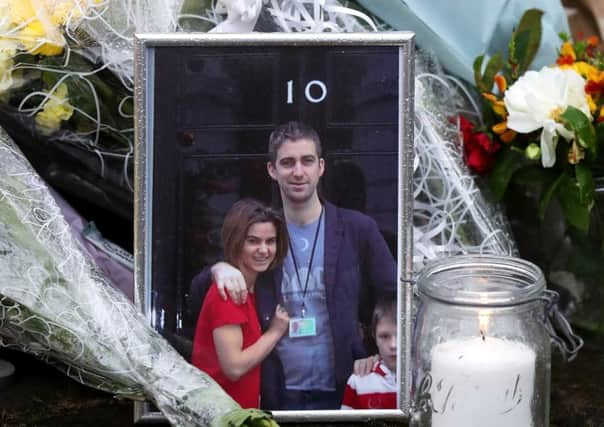Paris Gourtsoyannis: Jo Cox had empathy the EU debate lacks


Haltingly, politics will begin again. At some point in the next few days, doors will be chapped and leaflets pushed through letter boxes. At street level, the hidden machinery of a referendum campaign will resume its usual quiet hum.
The political rhetoric, when it begins to flow again, should be completely different. The shock of Jo Cox’s killing, and the astonishing bravery of her husband’s immediate appeal to “fight the hatred that killed her”, should give pause to those who have campaigned in anger, to inspire fear.
Advertisement
Hide AdAdvertisement
Hide AdWe don’t yet know for certain what the motivation was, but as in Orlando at the start of the week, it takes a deep well of rage, confusion and hate to deprive anyone of the most basic right to life.
Already, Brendan Cox’s words are being forgotten by those claiming any appeal for a more civil public discourse is politicising the tragedy of his wife’s needless death.
Not true. If anything, it is celebrating her political life. In the too-short time she was in parliament, it was already obvious that Jo Cox was full of respect and fellowship for all regardless of party background, working with opponents on issues that mattered to her in a typical Yorkshire spirit of just getting things done.
Eulogies are meant to capture a person’s best qualities, but even total strangers must be struck by the warmth of the admiration for the MP for Batley and Spen from everyone who met her. My colleague at the Yorkshire Post, Kate Proctor, who dealt with Cox regularly as one of the MPs on her patch, wrote yesterday: “She made me think I could achieve whatever I wanted to.” Only the most generous souls leave you feeling that way. It is a small and selfish point to make, but I wish I’d had the chance to meet her.
Her contributions in Hansard bear witness to one quality in particular that Cox clearly had in abundance. As a former aid worker, the plight of refugees, particularly those fleeing war-torn Syria, was the issue she felt most strongly about, and in her many contributions to debates on the migrant crisis and conflicts in the Middle East, it is her empathy that shines through.
There has been little of that empathy on display in the EU referendum campaign so far. It was particularly lacking on the morning of the day Cox was killed, in a poster launched by Nigel Farage using an image of a column of desperate people crossing a field in central Europe to stoke fear about an immigration system at “breaking point”.
But for decades, empathy has also been lacking for the communities that poster was aimed at, who have had to face the consequences of mass migration with little support and even less understanding. If a working-class revolt against immigration takes Britain out of the EU next week, as looks increasingly likely, it will be because the Remain campaign has offered those voters little if anything at all.
The murder of an MP on the steps of a library where she held her constituency surgeries also serves as a warning about the lack of empathy towards politicians themselves, who since the 2009 expenses scandal have been depicted as untrustworthy and venal.
Advertisement
Hide AdAdvertisement
Hide AdJo Cox is being talked about as possibly the best foreign secretary the UK never had, but I confess I had never heard her name before this week. If only more people had known someone like her was working on our behalf, and that out of the limelight, many are toiling for their constituents with the same vigour. Perhaps the way we consume our political debate isn’t geared up to give credit to the work of someone who was so obviously in politics solely from a desire to serve her community and the wider world.
We forget that our politicians can become targets. Tradition dictates that anyone can walk into the Palace of Westminster, march into the Central Lobby and demand to speak to their elected representative.
If that happens at all now, it happens very rarely. Westminster is a fortress, with concrete barriers, metal detectors and armed guards at regular intervals. In the modern age, none of this seems strange.
Yet when parliament isn’t sitting, the same people covered by that protection go out into their constituencies to meet anyone who comes through the door, with no more security than the average school, community centre or library can provide.
Yesterday MPs and MSPs upheld that vital democratic tradition in defiance of tragedy and fear, and despite their own grief. If there were any doubts about the fundamental humanity of our politicians, what happened this week has put them to rest.
The grandeur of the setting and the bizarre procedures make it difficult to see, but in reality the House of Commons feels like a family firm of 650 employees in a village of a few thousand. On Thursday, one of their colleagues was killed in the most wasteful, public and horrendous ways imaginable.
There are also now two children without a mother and a husband who has to raise them without his wife. It is unbearably painful to look at the image from the day before, with Brendan Cox piloting a boat in the EU referendum flotilla on the Thames, his son and daughter at the prow, probably having the time of their lives as they zipped over the water.
Their mother entered politics moved by empathy for others. “I know I personally would risk life and limb to get my two precious babies out of that hell-hole,” she said in a debate on admitting unaccompanied child refugees from Syria into the UK. Perhaps that’s why we feel her loss and her family’s pain so strongly now.